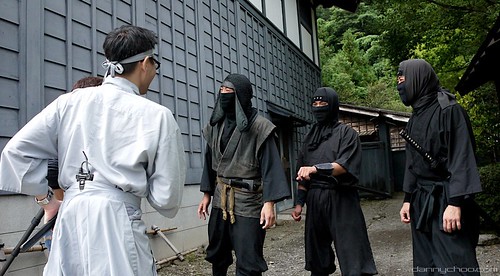Business Meetings in Japan: What I Learned
- Posted in:
- Essential Tips
- Meeting Tips

Hi there! If you're new here and like this article consider following us on twitter and our Meeting and Event Tips facebook page to keep up with our new content.
When I lived in Tokyo I had the opportunity to meet hundreds of professionals who ran behemoths like Sony, Toshiba, Honda, NEC and many others. As a corporate headhunter, my job was to learn about what they did, about who they were, and to convince them that they'd be better off working for one of the companies I represented.
As you may know, Japan can be seen as a stiff and formal country, governed by rules of etiquette that most Americans would find stifling. This was never more evident to me than during a business meeting. There are rules for everything: rules for the exchange of business cards, rules for where to sit, rules for bowing, rules for beginning a meeting, rules for ending a meeting, there are even grammar rules for formal business Japanese.
Americans can break the rules
The recruiting firm I worked for hired us Gaijin because we were exempt from those rules in many ways. We spoke English in our meetings not only because it was easier for us to communicate, but because we didn't have to use all the honorifics that Japanese people were obligated to use when talking to their social superiors.
Social superiors could be anyone, a customer, someone who had a higher ranking position within a company, or simply someone who happened to be older than us. As a recruiter who often found myself talking to country managers and CEOs, usually all three of those happened to be the case. Because English was the language we chose to conduct our meetings in, however, I wasn't obligated to use certain words that would put undue emphasis on a CEO's social superiority. We could meet as equals and negotiate deals without rules of etiquette getting in our way.
As an American, I got away with a lot. Not only did I not have to school myself on the intricacies of honorific language but I also didn't have to learn the various bows for the various situations which, according to many of my Japanese friends, we foreigners never get quite right. That said, there were some customs that, even as foreigners, we were obligated to adhere to:
Where to sit
I remember when I first sat down for an interview with the recruiting firm. I went into the room and took the chair nearest the door. I didn't think much of it, but when the office assistant came back to serve me a cup of tea, she politely informed me that I should take the seat farthest from the door.
Later I found out that as a guest in that office it was my right and privilege to sit in the seat facing the door. In feudal times, it was not unheard of for assassins to stick a blade through rice paper doors and impale a guest or two. This is why, to this day guests are expected to take the honor of sitting in the "safe" chair. I've tried looking this fact up, and couldn't find any evidence for it. Still, however, it makes for an interesting story.
Business Card Exchange
There were many subtleties to business card exchange that took a while to get the hang of. Since I was an American, the routine was to first shake hands, reach into a suit pocket and produce a business card holder, or meishi ire. We'd exchange cards holding them out with two hands, thumbs and forefingers on the bottom two corners. Since they were usually the guest and social superior, I would hold my business card a bit lower than theirs.
Business cards were not to be pocketed right away, but rather to be placed on the table in front of you. If you're meeting a group of people, this can be a useful way to remember people's names as well as keep track of who does what in the company. Although I'm now in the states, I still find this to be a useful little trick.
"Yes" and "No"
One thing that I found particularly frustrating was how Japanese businessmen often avoided saying no directly. If I presented an opportunity to them, they would often act as though they were very interested when, in fact, they were just being polite.
Our headhunting firm got around this hurdle by asking questions about about a prospect's interests, background and their work history. Once we knew pretty much knew everything there was to know about them, we had a good idea which one of our positions may be a good fit for their background and interests. We knew they would be interested in what we had to offer (and not feign interest out of politeness) because we spent time (sometimes even more than 20 minutes!) asking about their interests first.
In the States, people are much more direct about what they want and don't want, but that's not to say the same "mask of politeness" phenomenon doesn't happen here as well, albeit to a lesser extent. I have found that spending time knowing people's background and interests before asking for anything on my behalf has proven extremely useful.
What about you, what have you learned from meetings in other countries?
------
If you haven't yet, be sure to check out some of our meeting spaces.
Photo by Danny Choo.
Comments